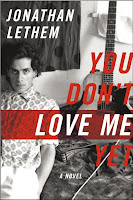
After a heavy read like "Blood Meridian," I tried to ease up a bit and read something a little more lighthearted. Glancing at my shelf, I saw a book I had found in the bargain bin at Barnes and Noble, got excited about and bought, and then instantly forgot about - Jonathan Lethem's 2007 novel "You Don't Love Me Yet."
The book follows a few months in the life of Lucinda Hoekke, tracing the rise and fall of her unnamed band. As the novel begins, she is working for an abstract artist answering and documenting phone call complaints. In her free time, she jams with a band which seems to have a lot of potential (in terms of character), but which hasn't written a breakthrough song, or even played a gig. One day she gets a call from a complainer (a recurring complainer, in fact), and she falls in love with him. During the conversations of their affair, she picks up on several unique phrases - such as "monster eyes" - which inspire her to help write some lyrics which eventually become the bands strongest song. The band gets their first gig at a failed art experiment which morphs into a real party and gets them some positive attention Unfortunately, the complainer was also at the party, and leverages his creation of many of their lyrics into making the band let him join. The complainer then sabotages the band's radio appearance, and they miss their big chance. Yet, in the end, everyone is paired off and happy.
(Oh yeah, and somewhere in the book is a subplot about the guitar player kidnapping a kangaroo from the LA zoo and the zoo denying it to save face.)
The book's biggest limitation was the inability to actually hear the band. Very little is ever even said about how their music would sound - there is a distinct lack of sensory detail for the reader's ears (if that makes sense, somehow).
I remember that there was a lot of negative feedback for Lethem when the book came out. And not undeserved, I can confidently say. This novel pales in comparison to his other novels, and isn't even in the same league as his masterpiece - "The Fortress of Solitude."
But, on the other hand, this novel never really aspires to be that type of book. So how can we complain when it doesn't achieve it? It's more like the outline for a romantic comedy with a twist-of-Lethem (mostly in the names of the characters). It
I can say that it was a nice, smooth read, and that it didn't require a lot of thinking - unlike "Walden" and "Blood Meridian." I can't say that it belongs on the same shelf as those books, though. It doesn't. It just doesn't.

